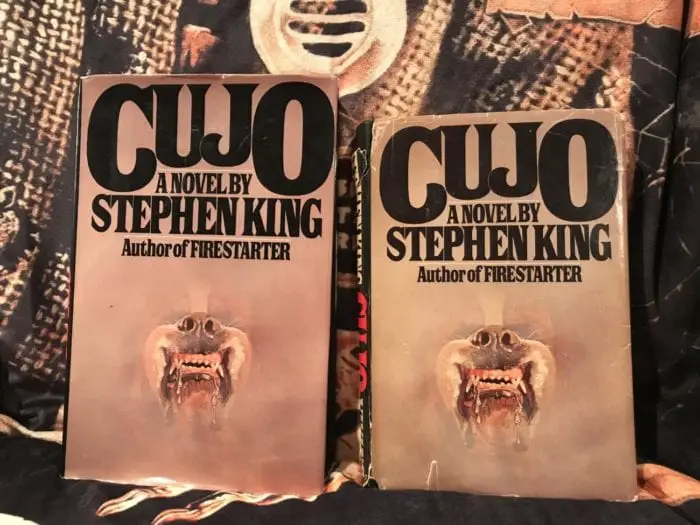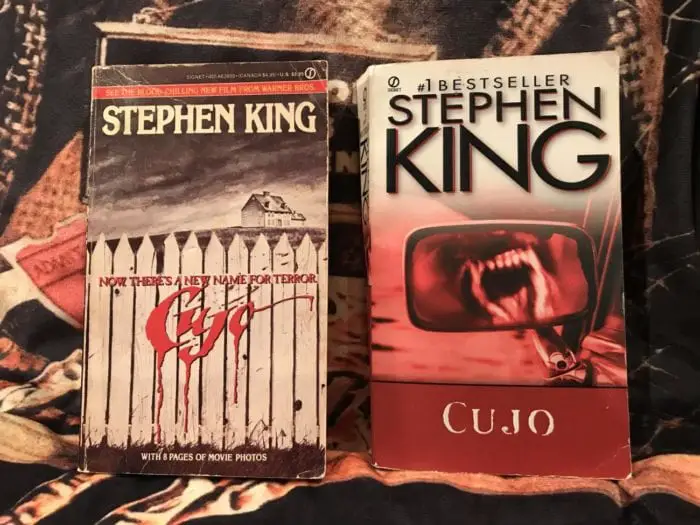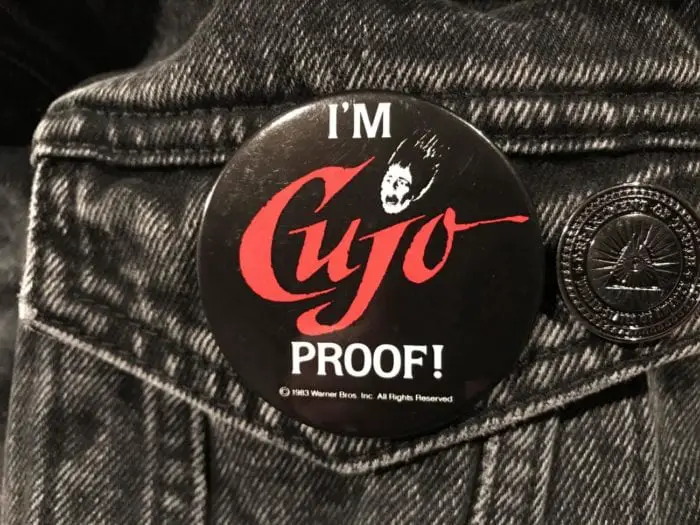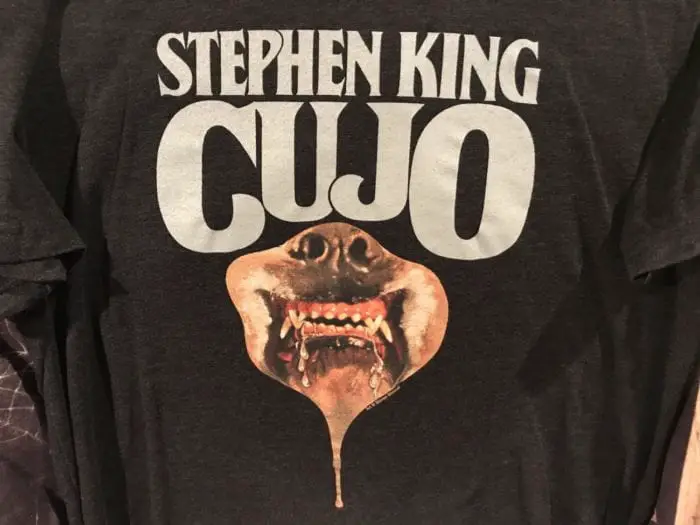In 1981, Stephen King unleashed (pun intended) a novel both partially overlooked and wholly misunderstood. It’s a story—a modern fairytale—about the human heart and the cold winds of discontent that sometimes bellow through it. It concerns itself with the inner workings of marred relationships through distinctly different lenses. It shines light on common feelings of yearning, chasing after change at any detrimental cost. It takes a glance at the economic impact of the late 1970s, festering on into a new decade—an oozy abscess that would eventually consume a major swath of America’s working-class demographic. Oh, yeah, and there’s a Saint Bernard with a particularly sh*tty case of rabies. This is a look at Stephen King’s Cujo, and a peek at how the novel is anything but the blood-hungry deranged dog fable many consider it to be.
Cujo is set in the now-familiar locale of Castle Rock, Maine, seat of King’s fictional Castle County. All sorts of awful have befallen the residents of “The Rock” through the years, from yarn to gloriously spun yarn, which makes it a little hard to believe Cujo’s rampage was only the second visit ‘constant readers’ had to the little town. The first being 1979’s The Dead Zone, a tale that busies itself with crooked politicians, mystical foresight, and a serial killer cop named Frank Dodd. That last little bit is important, and through Dodd, Cujo can be seen as something of a continuation of that tale.

I’m not going to spend a whole hell of a lot of time talking about the poor dog. And yes, I say poor dog because King’s writing gives the reader Cujo’s perspective, right along with those of the humans. Cujo, in truth, is a good boy. He loves “THE MAN, THE WOMAN, and THE BOY” (The Camber Family) very much, and lives in fear of being called “BADDOG.” He trots around Joe and Charity Camber’s property, a wag of the tail waiting for anyone and everyone. Things spoil for Cujo through the course of the book right in step with the souring of everyone else’s circumstances. King writes the dog as a metaphor—how even the best of us, with good intentions, can go south when an outside influence (rabies, infidelity, discontentment) takes us hostage. As a whole, America’s favorite killer canine comes off as far more of a creative writing tool in the novel than he does in the film.
Let me say here, I don’t plan on making this whole thing a compare and contrast with the 1983 film adaptation. In my opinion, those sorts of articles—though sometimes helpful—are often lousy, bloated, and redundant. Rather, I’d like to explore further how Stephen King’s writing in this novel makes for a deeper read than it may appear. There are many layers to this terrifying tiramisu, and, in truth, the scariest stuff has nothing to do with the dog. Let’s take a look at the Trenton family.
Donna and Vic Trenton’s hidden horrors bubble to the surface quickly. Donna has grown dissatisfied with her status as a homebound wife, and, prior to the book’s beginning, sought affirmation of her waning youthfulness in the arms of another man. Vic Trenton, a struggling advertising agent in the dawn of Regan’s America, has thrown himself at his work. Though hardly an absentee father to their young son Tad, Vic goes about his life thinking he has it all and is terrified he’s about to lose it. Really, almost everyone in this novel is afraid of losing something, and I think it’s important we focus on that.
As any ‘constant reader’ knows, some of the most underappreciated elements of Stephen King’s work are his periphery human monsters. Sure, they make shirts with Pennywise on them, but how often do you hear anyone decry the violent, racist, malignant cancer that is Henry Bowers? Exactly. One of Cujo’s big bads, plundering the Trentons’ marital bliss, is Steve Kemp. In Kemp, we get something a little unusual. He’s a tennis player, a woodworker, and a poet. He’s depicted initially as more artiste than classic abuser, in the typical literary sense. Kemp presents himself as a forward thinker, a “right-side-of-history” type. Yet under his phony calm waters lies a vicious, depraved man-child, more fragile and destructive than your modern conspiracy theorist. I’ve known a few winners like Kemp in my life. They’re the most dangerous of all, because you don’t know who they really are until they’re too close.

It isn’t just pure carnal lust that drives Donna Trenton into the arms of that hunk of feces. During an unnerving confrontation with Vic once he finds out about the affair, Donna offers up some beautifully put commentary on some very difficult feelings to express. King is really tapping a well not often spoken of with this:
You dust the empty rooms and you listen to the wind blowing outside sometimes. Only sometimes it seems the wind’s inside, you know? So you put on a record, Bob Seger or J.J. Cale or someone, and you can still hear the wind, and thoughts come to you, ideas, nothing good, but they come.
There’s more, and though I’d love to quote that whole chapter to you, I probably shouldn’t. But the conversation as a whole is breathtaking and truly the heart of the Trentons’ storyline. There’s a real fear of getting older, of settling in, of taking up the position life has handed you. And, perhaps most stark, the feeling Donna has of watching the world take more and more slices of Tad away from her as he grows older himself. She mentions him going off to school, and then soon middle school, then high school. It’s all a ride she’s being taken for, one that she’s found herself wondering how she got on in the first place. These moments are the most eloquent, the most terrifying. It’s because these fears, these notions King has Donna wander through, are real. As real as rain.
In antithesis to the Trentons is The Camber family. Joe and Charity Camber, along with their son Brett, are poorer. They’ve missed their middle-class ticket to ride, the one the Trentons are struggling to keep pinched between their collective fingers. Joe Camber’s reign over the family is tyrannical. He, too, is a human monster in this novel, and perhaps a little less obvious than Steve Kemp. His ham-fisted rule over the lives of Charity and Brett smacks of a sour truth still felt around the nation. It’s Joe’s way or the highway, and that sentiment spills over into his view of young Brett.

A little older than Tad Trenton, Brett Camber is at the crossroads in life where a man begins to be made of a boy’s frame. The blueprints are laid, the schematics crop up, the foundation is laid. Charity Camber—a character painstakingly imbued with a quiet determination for a better life—sees Joe’s influence on Brett and it scares her sh*tless. As a reader, I understand her feelings. Joe’s actions, which some might call “toxic masculinity,” are negatively influencing young Brett’s outlook on life. Charity lives in fear of losing her beloved son to the sexism, the callousness, the social detachment Joe flaunts on full display. Through the plausible magic of a $4,000 windfall from a winning lottery ticket, Charity bargains with Joe to take Brett to her sister’s down in Connecticut. This, of course, coincides with Donna Trenton needing work done on her shoddy Ford Pinto, Vic being out of town with a business partner, Rodger Brakestone, trying to salvage the Sharp Cereal account, Joe Camber not being able to work on Donna’s car because he and his equally awful pal Gary have been castrated and disemboweled respectively by now-rabid Cujo and…well, you know the rest.
The final act of the novel—the pinto, the dog, the blood, the bites, Sheriff Bannerman dying, Tad dying—is what we all no doubt knew best about the story itself. But here’s the thing, and this is perhaps the deepest take I can offer on the entire subject. Without Cujo, Charity Camber wouldn’t have the fresh start she had hoped for, free from the presence and permissions from Joe. She can raise Brett to be an upstanding young man, not a Joe or, heaven help us, a Steve Kemp! Even, in what would no doubt be a post-credit scene in today’s times, Charity surprises Brett with a new puppy. One with his vaccinations. See, ladies and germs: vaccinations, goooooood!
Donna and Vic, on the other hand, would still be wading through their post-affair twilight zone if not for the stand-off with the now-BADDOG. In effect, the thing they both loved most—Tadder—being removed from the equation, albeit horribly, seems to bring them closer together in the end. As awful as saying that may seem, there’s some logic behind it. Cujo didn’t take Tad away from them. Heat stroke, extreme thirst, and ungodly conditions in the Pinto did. Donna tried everything she could to keep him safe, to sustain him, and Vic acknowledges that in the end. She even put herself physically between the dog and Tad, getting a treatable case of rabies in the process. As dour of an ending as the Trentons get, they are together, exchange I love yous, and, little by little, King lets us know that they will get by. They’ll help each other—together—and things will get better for them. That might not have been the case for the couple earlier in the story, before everything. They’ll always feel Tad there, miss him, but their love has been fortified by the circumstances on the Camber’s property.

To me, I see this as one of King’s best and most overlooked accomplishments. The man received hate mail for writing Tad’s death. Whoopty doo. He’s received complaints about nearly all of his novels from every thin-skinned reader imaginable. Greg Stillson kicking a dog to death at the beginning of The Dead Zone earned King some fancily worded letters. I’ll say this, anyone who’d put an end to Fido’s life with a pair of loafers most certainly wouldn’t get my vote! That was his point. That’s characterization. That’s the art of the trade, giving you something you’ll feel, that will move your heart in an intended way. Put some boogie in your bones forever and all time. There’s no lack of that in Cujo. As a writer myself, I find resonance in these little twists of King’s. The real stuff. Life doesn’t always turn up sunny, flowers blooming from the ashes of the burned-out house. But maybe, just maybe, there’s hope. Hope is real, and without the bad toward that ending, there wouldn’t be the good down the road.
I’d like to close this out on a pinch more on the literary elements of the novel. Cujo is unique in a few different ways. For one, as mentioned much earlier, it does, in fact, act as a modern-day fairytale. The very first page of text even features a large “Once Upon A Time,” followed by the continuation of the sentence on the other side. The swift mentioning Frank Dodd having transformed into something of a Boogeyman, and his looming presence over—and possible connection to—the going on of the novel gives glimmers of the fantastic amongst the ordinary. There may or may not be a supernatural being in Tad Trenton’s closet. It might be Frank Dodd’s spirit! Maybe Frank’s ethereal hand set in motion all of the dominos of the final act? This remains unclear, however, the suspicion of such leaves you feeling uneasy regardless. There’s something to it, and King cleverly never says exactly what. That, to me, is intrinsically compelling.
Another thing that sets Cujo apart from the vast majority of King’s work is the novel’s lack of chapters or sections. From “Once Upon A Time,” you’re off! Space breaks are all that keep the paragraphs, the settings, the time changes in place, and that struck me as impressive. It gives the novel an immediacy that isn’t common. You don’t feel there’s anywhere to stop. But then again, when being told a fairytale or story, you don’t have chapter breaks to put the storyteller down with, do you?
Stephen King, in On Writing: A Memoir of the Craft, mentions Cujo in his detailed and deeply personal account of the addictions he’s fought hard to overcome.
At the end of my adventures, I was drinking a case of sixteen-ounce tallboys a night, there’s one novel, Cujo, that I barely remember writing at all. I don’t say that with pride or shame, only with a vague sense of sorrow and loss. I like that book. I wish I could remember enjoying the good parts as I put them down on the page.
Reading that, it’s rather heartbreaking to me. Cujo as a whole presents like an intricate clock, one that ticks further down and down, all the way to zero hours. Everything works together so perfectly, counterparts complimenting each other so fully. I can only imagine how it must feel to have something like that, a piece of work to be so very proud of, and have no memories of its creation. With this in mind, I will forever sing the praises Cujo.
The teeth of the novel, the work’s true soul, are not found in the mouth of a good dog gone bad. Rather, it is found in the very real, very human examination of struggle, fragility, and forgiveness. Give it a second look.
One more thing. Please, vaccinate your pets. And yourself.



